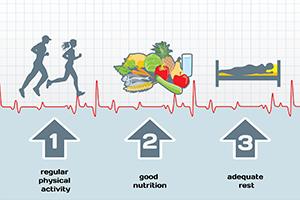
According to the World Health Organization, there are over 350 million people globally who are affected with depression. Maria Luedeke, Counsellor & Psychotherapist, CTRTC, stresses the urgent need to establish healthy physical self-care to battle Depression.
Depression and chronic conditions have a cyclical effect. Those with chronic illness are more susceptible to it and those with depression have a higher risk of other medical issues. This can become a vicious cycle that is difficult to escape from. Prioritizing physical self-care such as sleep, nutrition, exercise are imperative in breaking and prevention of this cycle and pushing away the black cloud.
Available as posters https://www.patientsengage.com/healthy-living/3-lifestyle-changes-manage-depression-posters
1. Exercise
Exercise can be a powerful anti-depressant. Research has shown that consistency is more important than quantity in improving mood disorders, so it is more beneficial to walk daily for 10-15 minutes than to do a 3-hour workout once a week. Choosing an exercise that is enjoyable and fits well into daily life is also essential to maximize the likelihood of adherence. Ideally, exercise should be done first thing in the morning or at least 3 hours before trying to sleep.
2. Sleep
Sleep is an area that is often cited by depressed individuals as problematic. Many feel constantly fatigued, have disrupted sleep cycles or are unable to sleep/wake at typical times which interferes with their ability to function normally in daily life. Sleep hygiene is an important skill to learn in general for good wellness and becomes integral when managing depression.
- Establish regular sleep and wake times and be consistent with those throughout the week.
- Avoid electronics 1-2 hours before bed, this includes phones, iPads, computers and TVs as the blue light emitted from these devices stimulates brain activity at precisely the time we are trying to induce relaxation.
- Reading on a Kindle or iPad can be done by adjusting the backlight to a softer setting but online reading should be avoided as it is too tempting to flip back and forth between websites and “surf” which is another brain stimulating activity that should be avoided at bedtime.
- Those who have difficulty falling asleep can try progressive relaxation exercises or deep breathing exercise; both of which induce relaxation and calm.
For more tips on sleep hygiene - 10 Tips For Better Sleep
3. Nutrition
There are numerous studies about the link between nutrition and mood. One such study by Harvard School of Public Health found that women were 41% more likely to suffer from depression when they regularly ate processed grains, sugary sodas, and red meats. Improving the quality of food eaten eliminates blood sugar spikes and dips that are linked to mood spikes and dips, and can increase energy and brain clarity.
The Indian Journal of Psychiatry states that patients with depression generally have inadequate nutritional intake, particularly foods high in essential vitamins, minerals and omega-3 fatty acids. Ensuring good nutrition, avoiding skipping meals and reducing high sugar foods can support mood stability.
Psychosocial Care
Practicing healthy physical self-care habits is one piece of managing depression. Paired with Intellectual, emotional and spiritual self-care this is a power approach of depression treatment. Psychosocial therapy and medication are integral components and should not be dismissed but empowering individuals with proactive self-care practices dramatically improves the positive outcomes of depression and mood disorders.

Maria Luedeke is Director of Aspire Counselling Pte Ltd, Singapore. Maria is a highly qualified Counsellor and Psychotherapist with educational qualifications from U.S. and Australian institutions and possesses a Certificate of Clearance from the Singapore Government authorizing her to work with children and adolescents in all settings.






